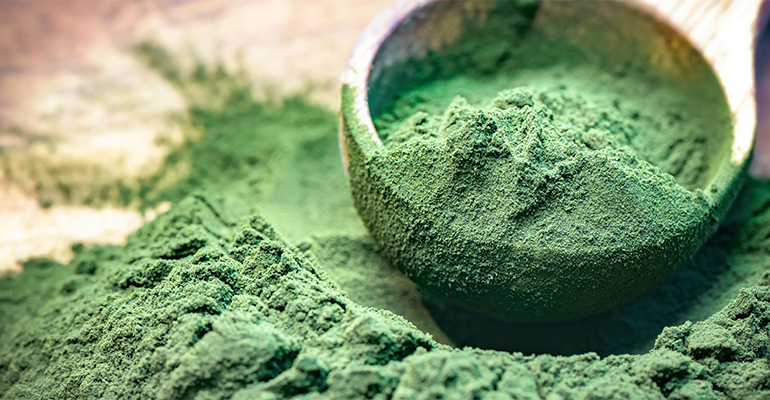Manufacturers use 100% spirulina to create plant-based salmon
2 Aug 2022Algae alternatives to meat and fish-based protein are opening up new opportunities for the plant-based alternative sector. These are the companies at the forefront of the change.
Spirulina, the nutrient-dense plant-based superfood is increasingly making its way onto our supermarket shelves. Most commonly found in the form of powder or tablets, the seaweed-like ingredient is hailed for its high protein content, and is a rich source of antioxidants, chlorophyll, vitamins, and minerals - particularly iron.

Despite being relatively new to the market, several companies are currently creating new applications and processing methods for the ingredient. A first of its kind for the sector, global food giant, IFFDuPont, recently joined forced with Israel-based startup, SimpliiGood, using their technology to develop a commercial smoked salmon analogue made entirely from whole fresh spirulina algae.
Could this new application offer a window of opportunity for the rapidly growing alternative seafood sector?
What is spirulina?
Spirulina has been present in health and wholefood stores for some time, most often in the form of powder which is added to the likes of health-boosting smoothies, juices, and cereal bars.
Increasingly, due to its plethora of health and environmental benefits, brands such as SimpliiGood by Israeli-based company, AlgaeCore Technologies are exploring how the fresh, whole form of the ingredient can be used, especially in the production of alternative seafood products.
Composed entirely of minimally processed spirulina, SimpliiGood’s plant-based salmon alternative is a clean-label product consisting of 40% protein. The product is designed to replicate the look, taste, feel and flavour of salmon, while removing the ocean pollutants commonly found in fish, such as mercury and fossil fuels.
Expected to hit the market by the end of next year, the product’s raw materials, colour and texture qualities will be manufactured by SimpliiGood, while the aroma and flavour will be crafted by IFF-Dupont.
“Our spirulina can act as a complete replacement for animal-based protein or be easily integrated into existing food products as an added-value ingredient, as it has a neutral flavour and maintains its full nutritional value,” said Lior Shalev, CEO and co-founder of Algaecore.
Several other companies such as Back of the Yards Algae Sciences (BYAS) are also tapping into the spirulina trend to produce plant-based meat alternatives which mimic the smell, taste, and grilling functionalities of the “bleeding” component of traditional whole cut meat and fish.
As more consumers across the world turn towards plant-based diets, manufacturers may want to keep a close eye on and tap into the opportunities that spirulina offers to the sector.
The production process: traditional vs. new
A freshwater alga, the common commercial spirulina that has until now been available to buy is cultivated by large manufacturers such as US-based Nutrex, in contained pools. Mature spirulina is then harvested and strained with stainless steel to produce a paste which is later washed and dried into the form of a powder.
Looking to disrupt the market, SimpliiGood’s offering is cultivated in a system of 90m3 capacity ponds housed in greenhouses located in the southern desert region of Israel. A daily harvest allows the company to produce 50 tonnes of spirulina per year.
To create the end product, two IP-protected technologies are used. One focusses on achieving the salmon-like texture, while the other identifies and isolates the spirulina’s native beta carotene pigment to produce the products orange-like colour.
Spirulina: the sustainable plant-based alternative
A key selling point for the product is its high eco-credentials. Using renewable solar energy from the harvesting site’s desert-location, in addition to recycling 98% of the water used in production, spirulina is a viable alternative to other plant-based alternative ingredients such as soy which have been associated with harmful environmental practises including widespread deforestation and habitat loss.
Despite requiring large amount of water for production, the low environmental impact of the ingredient is likely to appeal to consumers who are increasingly evaluating the eco credentials of companies and products when making purchasing decisions.
Compared to the likes of soy which requires large amounts of agricultural land to produce, spirulina is often cultivated in offshore pools of water, which makes the ingredient attractive for manufacturers looking to reduce their carbon footprint.
As regulators and consumers alike continue to place a watchful eye on the carbon sequestration of food and drink products and brands, environmentally friendly ingredients such as spirulina could be favourable to plant-based alternative food manufacturers.
“The strain that the animal food industry places on the environment and food security has elevated the need to develop sustainable protein substitutes. Spirulina requires salt, minerals, heat, CO2, and water to thrive and is one of the most efficient converters of sun energy into protein,” Shalev said.